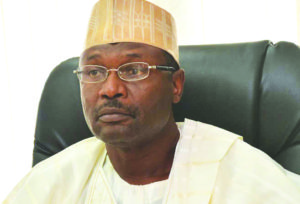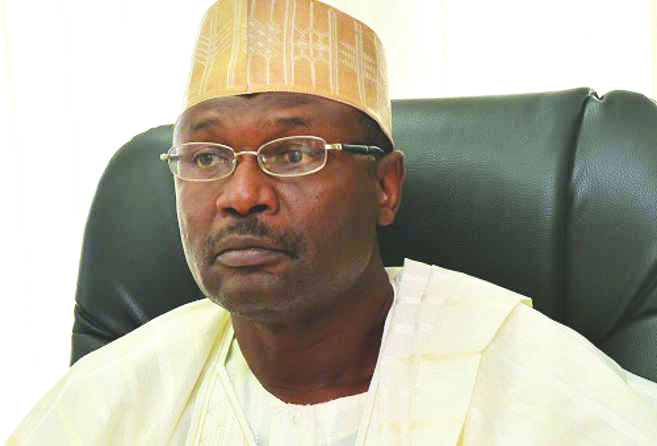The Independent National Electoral Commission maps out strategic plan for building a functional electoral system ahead of 2019 general elections

The 2019 general elections is about two years away, but the Independent National Electoral Commission (INEC) is already mapping out strategies to ensure that the exercise would be credible.
Recently, INEC held a two-day retreat in Lagos to review the implementation of its strategic plan for 2012-2016. The retreat was organised in collaboration with the United States Agency for International Development (USAID) and the International Foundation for Electoral Systems (IFES).
Professor Mahmood Yakubu, INEC chairman said at the opening of the retreat that the commission was poised to build a functional electoral system ahead of 2019 general elections. The retreat, he explained, was part of INEC’s strategic plan toward successful general elections in 2019 and beyond. He promised that the mistakes of the past elections would not be repeated in 2019, stressing that Nigerians expected a better performance. “The objective of this workshop is to retrospect and project, in two days, and come up with better ideas and solutions. We need to re-strategise for the 2019 general elections and beyond, to come up with practical solutions on how to strengthen the electoral process. This we will do based on the policies of fairness, transparency, credibility and impartiality,” he said.
According to him, the task before INEC is to conduct elections that will be acceptable to Nigerians. “Before the election, people expect the commission to plan ahead for a hitch-free exercise, in terms of voter’s card availability, proximity of polling units to voters and building of confidence that the votes will count. On the election day, people expect the polling officers and materials to arrive early. People want peaceful poll and functional equipment. Polling units must open at 8am. Materials and personnel must be available. There are other areas beyond the INEC; security and peaceful environment. A successful election does not come by fluke. It is a product of planning,” Yakubu said.
He stressed the need to reflect on the constitutional and legally defined responsibilities of the commission as well as analyse the legal and procedural framework for the management of elections in Nigeria. Yakubu said these include the standard principles, processes and regulations for election management in the country.
Reacting to the issue of misdemeanour on the part of some INEC officials, he said such unprofessional conduct would not go unpunished when brought to the attention of the commission. The commission, he added, has administrative processes already in place to tackle unprofessional conduct by any official.
The INEC chief said over 102 cases of arrest made by the police during the Rivers re-run, Edo and Ondo gubernatorial elections were currently in court.
Yakubu said 62 among those arrested have been prosecuted and sentenced. Reflecting on the controversial legislative rerun in Rivers State, the INEC chairman said the commission had ordered an “administrative review” of the exercise in a bid to prevent its reoccurrence.
He said plans were underway to conduct a credible governorship election in Anambra State later in the year, stressing that past pitfalls would be avoided.
Professor Bolade Eyinla, Technical Adviser to the INEC Chairman who explained the objectives and expectations of the retreat, described elections as the indispensable root of democracy. “For elections to have integrity, it must be conducted by the Election Management Board (EMB) with full independence of action in a professional, non-partisan and transparent manner. This requires professional EMB composed of persons whose credibility, neutrality and fairness are generally accepted,” he said.
Mr Shalva Kipshidze, Country Director of International Foundation for Electoral Systems (IFES) commended INEC for planning ahead of 2019 polls, noting that the move would provide a sense of direction and enable the commission outline measurable goals.
Nigeria, he observed, had taken a great leap in its democratic process with the 2015 elections and successful governorship polls in Edo and Ondo states. According to him, there is a greater expectation on the 2019 elections from the citizens and the international community. “The review of the 2012-2016 strategic plan is pivotal as it will provide the right platform for INEC to consolidate the gains made and continue to improve on the democratic process through critical, concise, constructive analysis and assessment to assist in strengthening subsequent strategic plan,” Kipshidze said.
The retreat was attended by electoral officers from the 36 states and the Federal Capital Territory (FCT). A few months before the retreat, INEC had on September 15, 2016 inaugurated a 15-member committee to develop a road map for its operations from 2017 to 2021. The committee known as the Strategic Plan Review Committee (SPRC) was headed by Mohammed Lecky, INEC National Commissioner. Members of the committee include Mr Abdullahi Kaugama, Olusegun Agbaje, Professor Bolade Eyinla and Okechukwu Ndeche, who will serve as Secretary. Other members are Professor Mohammed Kuna, Chima Duruaku, Paschal Ukaenwe, Omolaja Soyeolu, Dr Otive Igbuzot, Dr Peter Mba and David Asemo. Chidi Nwafor, Mrs Blessing Obidiegwu and Kola Oyelami are also members.
The committee’s terms of reference were to undertake a comprehensive audit of the 2012-2016 Strategic Plan and Plan of Action with budgetary alignment. The committee was also tasked to evaluate strategic issues emanating from the implementation of the 2015 election activities.
In addition, the committee assessed the impact of the 2012-2016 Strategic Plan of Action on the processes, actions and outcomes of the 2015 General Elections based on pre-election day and post-election reviews and reports. It equally identified threats, weaknesses, gaps, unfinished businesses, opportunities and innovations within the context of current electoral realities and their effect on the performance of the Commission.


